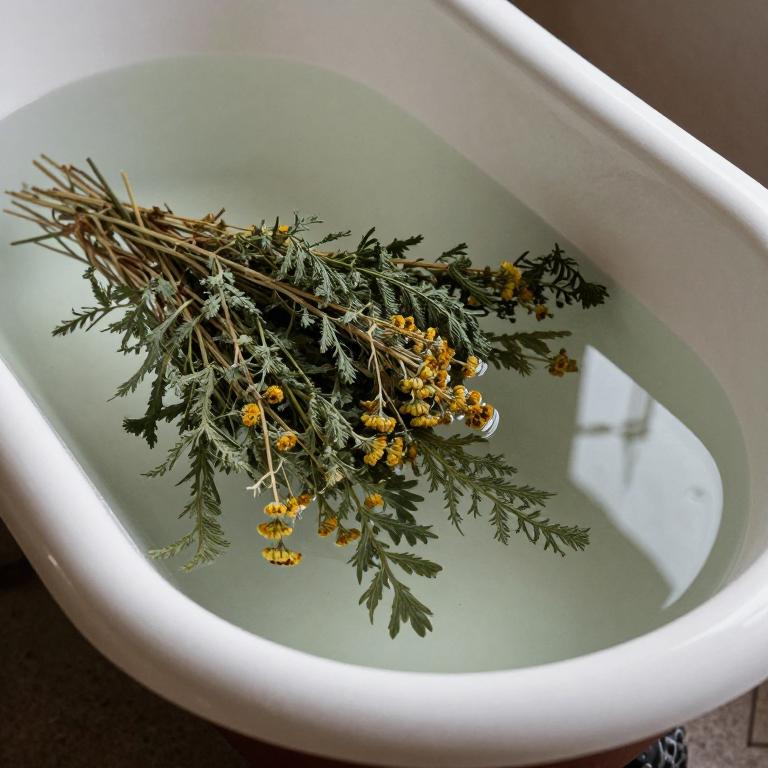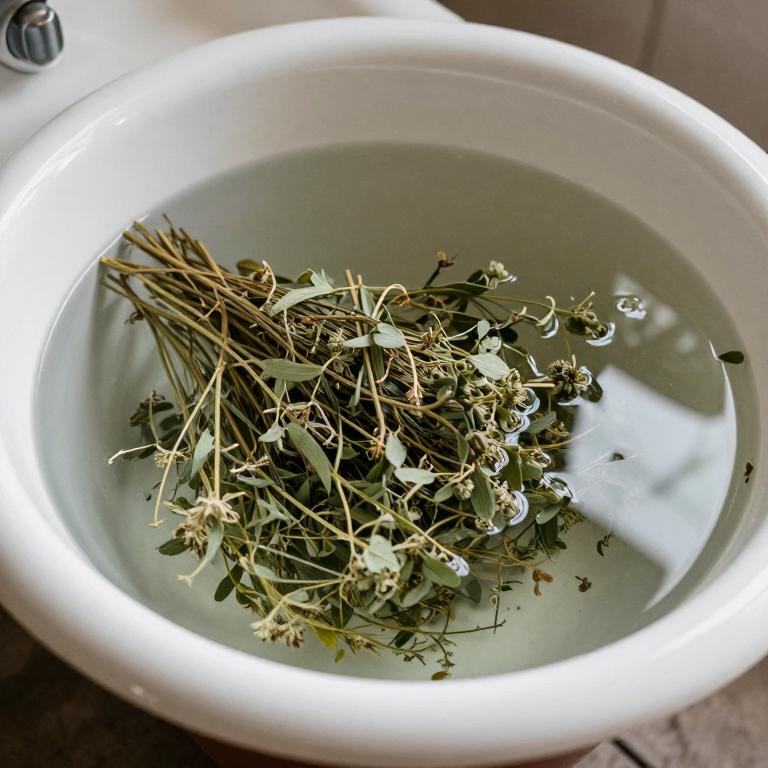10 Best Herbal Baths For Fatigue

Herbal baths for fatigue involve soaking in warm water infused with various herbs known for their soothing and restorative properties.
Commonly used herbs include lavender, chamomile, and Epsom salts, which help relax muscles and ease tension. These baths can promote better sleep, reduce stress, and improve overall energy levels by encouraging relaxation and detoxification. The warmth of the water combined with the therapeutic effects of the herbs can help alleviate mental and physical exhaustion.
Regular use of herbal baths can serve as a natural and calming way to combat fatigue and enhance well-being.
Table of Contents
- 1. Valerian (Valeriana officinalis)
- 2. Rosemary (Rosmarinus officinalis)
- 3. St. john's wort (Hypericum perforatum)
- 4. English lavender (Lavandula angustifolia)
- 5. Stinging nettle (Urtica dioica)
- 6. Yarrow (Achillea millefolium)
- 7. Wormwood (Artemisia vulgaris)
- 8. Lemon balm (Melissa officinalis)
- 9. Echinacea (Echinacea purpurea)
- 10. Salvia (Salvia officinalis)
1. Valerian (Valeriana officinalis)

Valeriana officinalis, commonly known as valerian, is a traditional herbal remedy often used in baths to alleviate fatigue and promote relaxation.
When infused into bath water, valerian's soothing properties can help reduce mental and physical exhaustion by calming the nervous system. The essential oils and active compounds in valerian, such as valerenic acid, are believed to have sedative effects that ease tension and improve sleep quality. Taking a valerian herbal bath can be a gentle and natural way to recharge energy levels and reduce stress-related fatigue.
This ancient practice is valued for its ability to restore balance and provide a sense of well-being through aromatherapy and hydrotherapy.
2. Rosemary (Rosmarinus officinalis)

Rosmarinus officinalis, commonly known as rosemary, is a fragrant herb widely used in herbal baths to alleviate fatigue and promote relaxation.
When infused into bath water, rosemary’s essential oils release calming and stimulating properties that help improve circulation and ease muscle tension. The aromatic scent of rosemary has been traditionally used to enhance mental clarity and reduce mental exhaustion, making it particularly beneficial for those experiencing burnout or chronic tiredness. Herbal baths with rosemary can also support the body's natural detoxification processes, further aiding in the recovery from physical and mental fatigue.
Incorporating rosemary into a regular bath routine can offer a soothing, rejuvenating experience that supports overall well-being.
3. St. john's wort (Hypericum perforatum)

Hypericum perforatum, commonly known as St. John's Wort, has been traditionally used in herbal baths to alleviate fatigue and promote relaxation.
When infused into bath water, the plant's active compounds, such as hypericin and hyperforin, may help reduce mental and physical exhaustion by supporting mood regulation and nerve function. The warm water combined with the calming properties of the herb can soothe tired muscles and ease stress, making it a popular remedy for those experiencing chronic fatigue. Herbal baths with St. John's Wort are often recommended for their gentle, natural approach to wellness, though individuals should consult a healthcare provider before use, especially if taking other medications.
Overall, these baths offer a soothing and aromatic way to rejuvenate the body and mind.
4. English lavender (Lavandula angustifolia)

Lavandula angustifolia, commonly known as English lavender, is widely used in herbal baths to alleviate fatigue due to its calming and soothing properties.
When infused into bath water, lavender essential oil or dried lavender flowers release aromatic compounds that promote relaxation and reduce mental and physical exhaustion. The soothing scent of lavender has been shown to lower stress hormones like cortisol, helping to ease the body’s response to fatigue. A lavender bath can also improve sleep quality, which is essential for recovery from fatigue.
Incorporating lavender into a bath routine can offer a natural, aromatherapeutic way to rejuvenate and restore energy levels.
5. Stinging nettle (Urtica dioica)

Urtica dioica, commonly known as stinging nettle, has been traditionally used in herbal baths to alleviate fatigue due to its rich content of minerals and antioxidants.
When infused into bath water, stinging nettle can help soothe tired muscles and promote a sense of relaxation. The anti-inflammatory properties of nettle may support the body's natural recovery processes, making it beneficial for those experiencing physical or mental exhaustion. Herbal baths with urtica dioica are often recommended for their calming effects and ability to enhance circulation.
Incorporating this plant into a regular self-care routine can offer a natural and gentle way to combat fatigue and improve overall well-being.
6. Yarrow (Achillea millefolium)

Achillea millefolium, commonly known as yarrow, has been traditionally used in herbal baths to alleviate fatigue and promote relaxation.
When infused into bathwater, yarrow's calming properties can help soothe tired muscles and ease mental exhaustion. The plant contains essential oils and flavonoids that may support circulation and reduce inflammation, enhancing the body's natural recovery processes. Herbal baths with yarrow are often recommended for individuals experiencing chronic fatigue or stress-related exhaustion.
Incorporating yarrow into a bath routine can provide a gentle, natural way to restore energy and balance.
7. Wormwood (Artemisia vulgaris)

Artemisia vulgaris, commonly known as wormwood, has been traditionally used in herbal baths to alleviate fatigue and promote relaxation.
When infused into water, the essential oils and phytochemicals of artemisia vulgaris can be absorbed through the skin, offering a soothing effect on the body. These baths are believed to help reduce mental and physical exhaustion by improving circulation and calming the nervous system. The aromatic properties of artemisia may also have a grounding and uplifting effect, enhancing mood and energy levels.
However, it is important to use artemisia vulgaris with caution, as it can be toxic in high doses and may interact with certain medications.
8. Lemon balm (Melissa officinalis)

Melissa officinalis, commonly known as lemon balm, is a versatile herb often used in herbal baths to alleviate fatigue and promote relaxation.
When infused into bath water, lemon balm releases calming compounds that help reduce mental and physical exhaustion. Its mild sedative properties can ease stress and anxiety, which are common contributors to feelings of fatigue. The soothing aroma of lemon balm also enhances the overall bathing experience, encouraging a sense of tranquility and well-being.
Regular use of melissa officinalis herbal baths may support long-term energy balance and improve overall vitality.
9. Echinacea (Echinacea purpurea)

Echinacea purpurea, commonly known as purple coneflower, has been traditionally used for its immune-boosting properties, and recent studies suggest it may also offer benefits for fatigue relief.
Incorporating echinacea into a herbal bath involves steeping the dried plant in hot water and then adding it to a warm bath, allowing the active compounds to be absorbed through the skin. This method is believed to help reduce mental and physical exhaustion by promoting relaxation and improving circulation. The anti-inflammatory and antioxidant properties of echinacea may contribute to its potential efficacy in alleviating fatigue.
However, while some anecdotal reports support its use, more scientific research is needed to fully understand its effects on fatigue when used in bath form.
10. Salvia (Salvia officinalis)

Salvia officinalis, commonly known as sage, has been traditionally used in herbal baths to help alleviate fatigue due to its calming and soothing properties.
When infused into bath water, sage releases essential oils that can promote relaxation and reduce mental and physical exhaustion. The aromatic compounds in sage, such as thujone and cineole, are believed to enhance circulation and ease muscle tension, contributing to overall rejuvenation. Taking a sage herbal bath can also support mental clarity and emotional balance, making it a natural remedy for those seeking relief from stress-related fatigue.
Incorporating salvia officinalis into a regular bathing routine may offer a gentle, holistic approach to restoring energy and well-being.